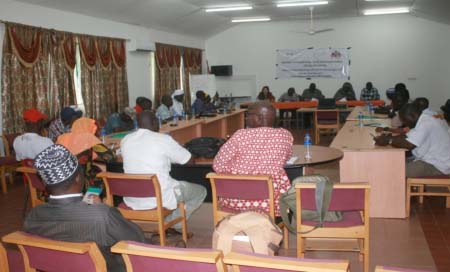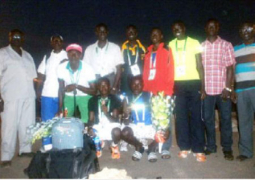
(Tuesday 15th October 2019 Issue)
Family
and Intergenerational Literacy and Learning (FILL), Monday started its second
phase of facilitators training. The ongoing four-day training is a follow up on
the earlier three-day consultative workshop held in July.
The
training is a continuous collaborative effort of the Ministry of Basic and
Secondary Education (MoBSE), The Gambia National Commission for UNESCO (NatCOM)
and partner – UNESCO Institute for Lifelong Learning (UIL), meant to make education
more accessible among children and adults living in socio-economically
disadvantaged communities.
The
training targets to enable participants to acquire and share knowledge, skills
and educational practices gained from the training with literacy participants
in a bid to improve their reading, writing and livelihood skills.
It
also targets to enhance the learning environment through appropriate models of
family literacy and learning approaches and support the development of
functional literacy skills of learners in the project intervention sites.
Currently
underway at the Region one Education Directorate in Kanifing, the training is
funded by German Federal Foreign Office with technical support of UNESCO
Institute for Lifelong Learning (UIL).
Family
and Intergenerational Literacy and Learning Programme (FILL) is an initiative
that aims to promote and develop literacy, numeracy and functional skills of
both children and adults. Also, it brings together adults and their children to
learn reading and writing together.
The
programme objective is to make education more accessible by promoting basic
literacy-reading, writing and numeracy-skills development among children and
adults living in socio-economically disadvantaged communities and to enable
family members to share knowledge, skills and practices gained from the
programme.
Tida
Jatta-Jarjou, director of Basic and Secondary Education Directorate (BSED) said
the May 2018 MoBSE, UIL and NatCOM co-organized technical workshop was used as
a key to familiarize key stakeholders in The Gambia with intergenerational
learning approaches to literacy.
She
said since September 2018, the project has been piloted in close collaboration
with NatCOM and MoBSE with technical support from UIL, Hamburg office.
Mrs
Jatta-Jarjou said the pilot project selected Njama Sinyan and Kaleng Jawbeh
communities in regions 3 and 5 as implementation sites, while the literacy
classes were organized in Wolof and Pulaar. “They are the respective languages
of the two communities,” she said.
She
explained that 2016-2030 education policy emphasizes on increase access for
adults and out-of-school children to functional literacy and numeracy
programmes in order to significantly reduce illiteracy by 2030.
Sofia
Chatzigianni, assistant programme specialist, Godfrey Sentumbwe, co-trainer
from Uganda and Lamin Jarjou, Senior Program Officer at NatCOM all made remarks
and highlighted on the ultimate aim of the training.



